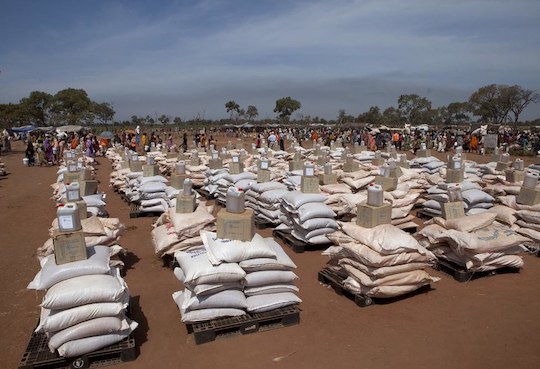
Number of people facing extreme hunger in Sudan predicted to double
The number of people who are severely hungry in Sudan could double by September as a result of poor harvests, economic crisis, internal conflict and the Russian invasion of Ukraine, the UN has warned.
In a joint statement, the World Food Programme (WFP) and the Food and Agricultural Organisation said more than 18 million people could face extreme hunger over the coming months, up from about 9 million currently in need of aid.
“There are already worrying signs that access, affordability and the availability of food is shrinking for most people in Sudan, which is pushing more people deeper into poverty and hunger,” said Eddie Rowe, WFP’s country director in Sudan.
According to a UN assessment published this week, harvests from this month’s cereal production are expected to be more than a third lower than last year. Sorghum harvests are expected to be down by 32%, while millet production is estimated to be less than half yielded in 2020.
Food prices have been steadily rising over the past few months. A loaf of bread has increased to 50 Sudanese pounds (SDG), up from 30 last week. A 50kg sack of sugar has risen to from 18,000 to 30,000 SDG in the last 10 days. A litre of gasoline increased from 320 SDG pounds in November to 672 SDG this week.
Hussien Khair el-Said, a father of six, and farmer in Wad-Ashana in North Kordofan, one of the regions experiencing an influx of people displaced by conflict, said he lost all his sorghum plants this season because the rains did not come. “People are really struggling here. They have reduced the meals they have a day,” he said. “I sometimes work as a teacher and was hoping my agriculture would help me. This year, we are facing a lot.”
Attempts to import cereals into Sudan could be hampered by the weakening national currency, which has fallen sharply since October’s coup, and the war in Ukraine. Sudan is dependent on wheat imports from the Black Sea region: about 50% of its wheat came from Russia last year. Any disruption to the flow will increase prices, which have already risen by 180% to $550 a tonne since the first quarter of 2021.
“The ripple effects created by the bullets and bombs landing in Ukraine will be felt far and wide, including here in Sudan, as families are set to suffer even further with basic meals becoming a luxury for millions,” said Rowe.
Original source: The Guardian
Image credit: All rights reserved by Christian Aid Images, flickr creative commons
